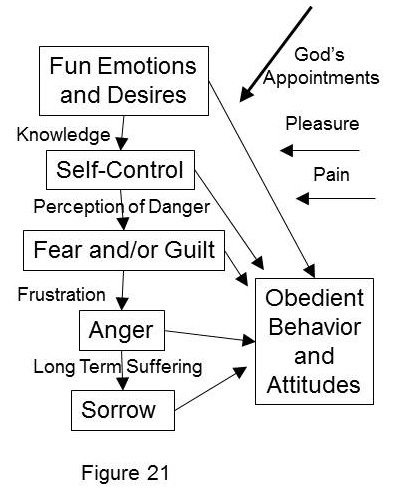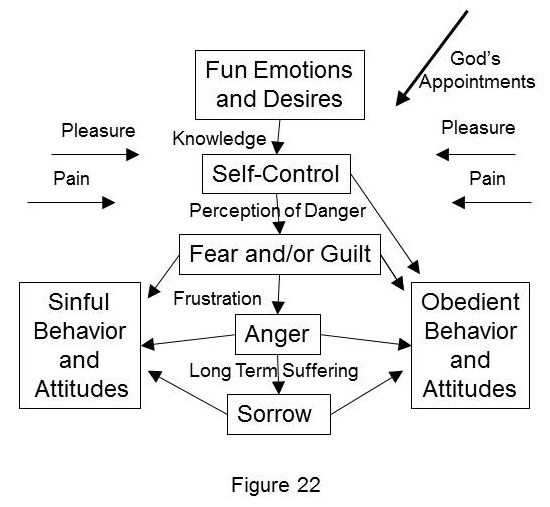| << | Contents | >> |
Exchanged Glory V: God Meant it for Good
Chapter Twenty-Two. Job
That is my take on the story-line …The book of Job tells how God saved one of his dearly loved children from a fate worse than the plagues that fell on him.
An Unexpected Question
In the second half of 2002, I was in the early stages of using the Pain Drain to grieve the loss of countless imaginary worlds. For years I had fought off my fantasies and inner monsters with logic, willpower, and anger.[70] Now I gave them a proper burial with mourning.
It was a tough process, and although I could tell God was healing me, I wasn’t feeling much joy at first. At times, it seemed as if I would never again really be happy. Could the ache in my heart heal to the point where I could let my guard down and once again have childlike fun?
One day as I considered this, I thought about Job’s trials. I prayed, “Lord, could Job ever really laugh again after what he suffered?” Immediately a second question appeared in my head. “Could Job really laugh before he suffered?”
That thought caught me off guard. I wasn’t sure if it had any significance, but I decided to take a look to see if God was speaking to me.
Without Cause
The book of Job is controversial, so I need to clarify a few issues before I look at the question of whether Job could laugh. Many people believe that Job opened the door to his suffering through fear, unbelief, selfishness, or some other sin. I believe this is unscriptural:
Then the LORD said to Satan, "Have you considered My servant Job, that there is none like him on the earth, a blameless and upright man, one who fears God and shuns evil? And still he holds fast to his integrity, although you incited Me against him, to destroy him without cause." (emphasis added)
(Job 2:3)
The above scripture records God’s words after Job’s suffering had started. In spite of the many possible sins on Job’s part that we might think led to his misfortune, God lets us know that Job was blameless. He did not do anything to cause his troubles.
I have heard people teach the book of Job as if Satan went to God and said, “I know You want to protect Job, but You have to let me destroy him. His sin has opened the door for me.” I love the people who have said this, but I believe it is totally out of line with what the Bible actually says. God is extremely clear that Job had the door shut tight. The only way that Satan could get in was to accuse him of a future “potential sin” (that he would curse God if he faced trouble):
“But now, stretch out Your hand and touch all that he has, and he will surely curse You to Your face!”
(Job 1:11)
Even after Job was first afflicted, he was so committed to righteousness that his character held true. The Bible confirms this by saying he held fast to his integrity even after his possessions and children were taken from him. And not only does God not blame Job, He also takes responsibility for what happened, saying that He was incited to destroy Job without cause (although we know that God wasn’t guilty of wrongdoing).
I don’t see any way around the conclusion that Job was a victim of circumstances beyond his control. God explains what happened, and it is a bad idea to disagree with God. His words might be tough for us to accept, because they make us wonder if He will allow Satan to attack us in a similar way. Still, we must conclude that Job’s suffering was without cause.
Distinctions
Having said that, we need to make a couple of distinctions: First, “without cause” does not mean “without purpose.” Job’s sufferings weren’t random and pointless; there was a plan behind them. God wanted to show Job more of His goodness, and He used Satan’s attacks to help bring about this end result. Though this was extremely painful for Job, it is clear that he was better off at the close of the book than he was at the beginning:
I have heard of You by the hearing of the ear, but now my eye sees You.
(Job 42:5)
…You've heard, of course, of Job's staying power, and you know how God brought it all together for him at the end. That's because God cares, cares right down to the last detail.
(James 5:11, The Message)
After Job had interceded for his friends, GOD restored his fortune — and then doubled it!
(Job 42:10, The Message)
Job’s relationship with God grew through the trials. Beforehand, he was like a blind man who could only learn through hearing and feeling; afterward, he had the fuller revelation of one who could see. What could be better than getting to know God more fully? Beyond this, Job received twice as much as he had at the beginning. There was a plan; God was working it for good.
The second distinction we need to make is that “without cause” does not mean that Job handled his trials perfectly. In fact, the Bible is clear that though sin didn’t lead to Job’s pain, his pain did lead to sin. After Job’s trials continued for a while, he began to disobey God. That is why we see him repenting at the end of the book.
Therefore I abhor myself, and repent in dust and ashes.
(Job 42:6)
Healthy Emotion Commotion
We can describe what happened to Job in terms of the Emotion Commotion Chart. While God had a hedge of protection around him (Job 1:10), his Fear of the Lord (Job 2:3) worked with his healthy Self-Control, Guilt, Anger, and Sorrow to keep him on the Obedient Behavior and Attitudes side of the chart. As a result, he was an example of righteousness in the earth.

| Prev Fig | Next Fig |
In Job’s state of blessing, he was able to walk as no one else did (Job 1:8). Even after he lost everything, he managed to keep himself on the Obedient Behavior and Attitudes side of the chart for a time. His Fun Emotions and Desires were incapacitated, but his discipline held strong.
Job got to his feet, ripped his robe, shaved his head, then fell to the ground and worshiped: Naked I came from my mother's womb, naked I'll return to the womb of the earth. GOD gives, GOD takes. God's name be ever blessed. Not once through all this did Job sin; not once did he blame God. (emphasis added)
(Job 1:20-22, The Message)
Unhealthy Emotion Commotion
Eventually, however, the attacks of Satan drove Job into levels of Fear, Anger, and Sorrow that He couldn’t handle. In his distress, he began to blame God.
It is all one thing; therefore I say, 'He destroys the blameless and the wicked.' If the scourge slays suddenly, He laughs at the plight of the innocent.
Obviously, God does not laugh at the plight of the innocent. Job was now speaking carelessly and sinning with his words.
Though those words were similar to what someone might say out of godly Brokenness, we need to make another important distinction here. Job did not display the humility that should accompany Brokenness. Instead, his heart rose up in pride to accuse God. He was turning from his desperate need for grace to demanding justice based on his own righteousness. Brokenness admits weakness; Job was claiming strength. He had fallen into new expressions of his emotions symbolized in Figure 22.

| Prev Fig | Next Fig |
Fear, Anger, and Sorrow were now moving Job away from his previous choices. Obedience was not bringing the results he wanted, so he allowed himself to express his anguish with disobedience (the arrows to the Sinful Behavior and Attitudes box). At the same time, however, he held on to the main part of his faith. He didn’t declare that God was a myth and we should all worship idols (the remaining arrows to the Obedient Behavior and Attitudes box).
Job still had faith, but it was now mixed with wrong attitudes that drove him to try to badger God into answering his prayers. He was reacting out of his own perceptions rather than according to truth. (Yet who could harshly blame him for this? Haven’t we all reacted in similar ways to far smaller trials?)
Potential Disobedience
In conclusion, Job was innocent before the suffering, and therefore his suffering was without cause, but he also had a weakness that was hidden beneath his blessings. It was a “potential disobedience” that came out only under the suffering.
We have to wonder then …why would God allow the suffering? Why not simply let “potential disobedience” stay potential? I don’t believe the book of Job spells out the answer, but I do believe that with a little knowledge from other parts of the Bible, we can piece together a picture that makes a great deal of sense. It lines up with what we know about both human nature and God’s love, and it sheds light on the significance of the question that I opened this chapter with, “Could Job laugh before he suffered?”
I believe God allowed Job’s suffering because this was the best way to root out Job’s “potential disobedience” before it grew to be a real problem. If Job’s weakness had remained hidden, it would have eventually turned into something that would have caused serious damage. God saw that and protected Job by permitting the anguish that pushed his weaknesses into the open at a time when it could be safely healed.
This approach to the book of Job puts a powerful loving spin on what, at first, looks like meaningless suffering. I know it still leaves us with some frightening possibilities, because we all have “potential disobedience” lying around in our hearts. Under the right circumstances, any number of ugly attitudes and actions could rise to the surface. We don’t like to think that God would allow pain that would bring our messes into the open, but isn’t it comforting to know that if something will truly hurt us, He cares enough about us to deal with it before it reaches critical mass?
That is my take on the story-line behind the book of Job. It is better to have a sin exposed while it is still in seed form than to let it grow and mutate beneath the surface. The book of Job tells how God saved one of his dearly loved children from a fate worse than the plagues that fell on him.
Search Comments
This page has been visited 0006 times.
| << | Contents | >> |
10 per page